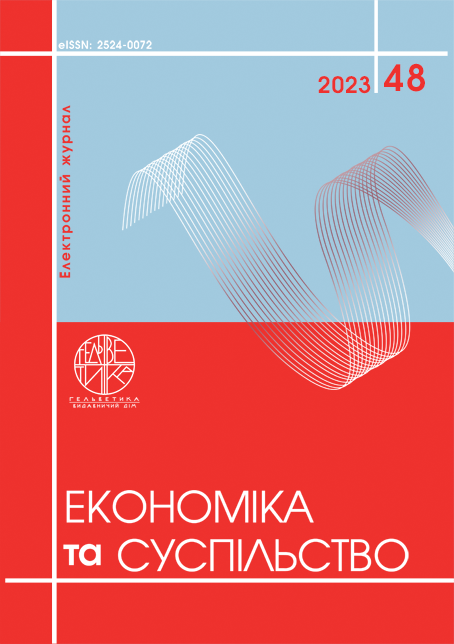THE ROLE OF ECONOMIC AND DIGITAL FACTORS IN COMBATING CORRUPTION
Abstract
This article is devoted to the investigation of the impact of economic and digital factors on anti-corruption policy. The paper considers the main causes of corruption, its negative impact on social processes and political stability, and ways to overcome it. It was emphasized that corruption weakens the economic growth of countries, reduces citizens' trust in the government. Bribery, its scale, dynamics and specification are a consequence of political, social and economic problems of countries, and the world has not yet come up with a single recipe for fighting corruption. Research revealed that digitization can significantly increase the openness, publicity and transparency of public administration, identify corrupt connections, schemes and relationships, optimize anti-corruption activities of law enforcement agencies and limit the opportunities for corrupt officials. In the period of a post-war recovery Ukraine will need significant reforms, especially in the anti-corruption sphere, so there is an objective scientific and practical demand for a comprehensive study of anti-corruption issues. During the writing of the article the methods of theoretical and practical research were used, including the method of the panel data analysis. The empirical results have proved that the promotion of digital economy can significantly minimize corruption. For example, the digital economy can help tackle corruption by enabling greater transparency, reducing opportunities for corrupt practices, and empowering citizens to participate in the fight against corruption. As technology continues to evolve, there will likely be even more opportunities to leverage the digital economy to combat corruption and promote transparency and accountability. Based on the obtained resuts, the recommendations for tackling corruption were suggested.
References
Transparency International: Corruption Perceptions Index. URL: https://www.transparency.org/en/cpi/2020/index/nzl (Date of application: 10.11.2022).
Bardhan, P. (2017). Corruption and development: a review of issues. Political Corruption, 321-338.
Gardiner, J. (2017). Defining corruption. In Political Corruption (pp. 25-40). Routledge.
Huntington, S. P. (2017). Modernization and corruption. In Political corruption (pp. 253-264). Routledge.
Doshi, S., & Ranganathan, M. (2019). Corruption. Keywords in Radical Geography: Antipode at 50, 68-73.
Does Being A Large Country Lead to Higher Corruption? URL: https://blogs.worldbank.org/developmenttalk/does-being-large-country-lead-higher-corruption (Date of application: 10.11.2022).
David Dollar, Raymond Fisman, Roberta Gatt (2011). Are women really the “fairer” sex? Corruption and women in government. URL: https://sites.bu.edu/fisman/files/2015/11/fairersex.pdf (Date of application: 10.11.2022).
Shrabani Saha. Investigating the Interaction Effect of Democracy and Economic Freedom on Corruption: A Cross-Country Quantile Regression Analysis. (2009). URL: https://core.ac.uk/download/pdf/143885223.pdf (Date of application: 10.11.2022).
Wayne Sandholtz and William Koetzle (2000). Accounting for Corruption: Economic Structure, Democracy, and Trade. URL: https://isq.oxfordjournals.org/content/44/1/31.full-text.pdf (Date of application: 10.11.2022).
Ata and Arva (2011). Determinants of economic corruption: a cross-country data analysis. URL: http://www.ijbssnet.com/journals/Vol._2_No._13_Special_Issue_July_2011/17.pdf (Date of application: 03.05.2021).
Van Rijckeghem and Weder (1997). Corruption and the Rate of Temptation: Do Low Wages in the Civil Service Cause Corruption? URL: https://papers.ssrn.com/sol3/papers.cfm?abstract_id=57168 (Date of application: 10.11.2022).
Musila and Sigue (2010). Does corruption impede international trade? New evidence from the EU and the MENA countries. URL: https://www.researchgate.net/publication/301910922_Does_corruption_impede_international_trade_New_evidence_from_the_EU_and_the_MENA_countries (Date of application: 10.11.2022).
Rory Truex (2011). Corruption, Attitudes, and Education: Survey Evidence from Nepal. URL: https://static1.squarespace.com/static/5431e6ebe4b07582c93c48e3/t/5432fc1fe4b09a386a2a4548/1412627487321/Truex+-+2011+-+Corruption%2C+Attitudes%2C+and+Education.pdf (Date of application: 16.11.2022).
Andersen (2011). Does the Internet Reduce Corruption? Evidence from U.S. States and across Countries. URL: https://openknowledge.worldbank.org/bitstream/handle/10986/13481/wber_25_3_387.pdf?sequence=1&isAllowed=y (Date of application: 16.11.2022).
Sanjeev Gupta (2002). Governance, Corruption, & Economic Performance. URL: https://www.researchgate.net/publication/234791577_Governance_Corruption_Economic_Performance (Date of application: 16.11.2022).
Daniel Treisman (2000). The causes of corruption: a cross-national study. URL: https://www.amherst.edu/media/view/131389/original/Treisman2000.pdf (Date of application: 16.11.2022).
Bhattacharyya and Hodler (2015). Natural Resources, Democracy and Corruption. URL: https://www.researchgate.net/publication/222656604_Natural_Resources_Democracy_and_Corruption (Date of application: 16.11.2022).
Kaufman and Wei (1999). Does 'Grease Money' Speed Up the Wheels of Commerce? URL: https://www.researchgate.net/publication/272693932_Does_'Grease_Money'_Speed_Up_the_Wheels_of_Commerce (Date of application: 16.11.2022).
Fisman and Gatti (2002). Decentralization and Corruption: Evidence from US Federal Transfer Programs. URL: https://www.researchgate.net/publication/5154179_Decentralization_and_Corruption_Evidence_from_US_Federal_Transfer_Programs (Date of application: 16.11.2022).
Dell’Anno and Teobaldelli (2015). Keeping Both Corruption and the Shadow Economy in Check: The Role of Decentralization. URL: https://www.researchgate.net/publication/272018786_Keeping_Both_Corruption_and_the_Shadow_Economy_in_Check_The_Role_of_Decentralization (Date of application: 04.05.2021).
Pellegrini and Gerlagh (2008). Causes of Corruption: A Survey of Cross-Country Analyses and Extended Results. URL: https://www.researchgate.net/publication/24054340_Causes_of_Corruption_A_Survey_of_Cross-Country_Analyses_and_Extended_Results (Date of application: 18.11.2022).
Rajeev K (2010). Goel and Michael A. Nelson. Causes of corruption: History, geography and government. URL: https://core.ac.uk/download/pdf/6659495.pdf (Date of application: 18.11.2022).
Digital Public Services. URL: https://ec.europa.eu/digital-single-market/en/digital-public-services (Date of application: 16.11.2022).
Transparency Portal. URL: https://www.transparency.gov.au/ (Date of application: 16.11.2022).
Introduction to Crowdsourcing. URL: https://www.crowdsource.com/crowdsourcing-terminology/crowdsourcing/. (Date of application: 20.11.2022).
Why choose the WhistleB whistleblowing service? URL: https://whistleb.com/the-service/ (Date of application: 20.11.2022).
Posipaki. URL: https://bihus.info/projects/posipaki/. (Date of application: 20.11.2022).
Dozorro. URL: https://dozorro.org/ (Date of application: 20.11.2022).
ProZorro. URL: https://www.dzo.com.ua/?utm_source=google&utm_medium=cpc&utm_campaign=prozorro&utm_content=prozorro&utm_term=%2Bprozorro&gclid=CjwKCAjwmv-DBhAMEiwA7xYrd8vMXIODIvcWfCEQLxuwdZ3k4qU5dwo8yanpaj29heM0MMid--rqPRoCsjkQAvD_BwE (Date of application: 20.11.2022).
The Law of Ukraine "On Public Procurement": Information of the Verkhovna Rada (VVR). 2016, No. 9, Article 89.
Competition Act of Canada: R.S.C., 1985, p. 34.


